Glowing, radiant skin is not just vibrant and youthful; it reflects our internal health and balance. Our skin can tell us a lot!
Based on Chinese and Ayruvedic Medicine, face Mapping connects changes in our skin to our internal environment. With this information we can identify and address areas requiring attention and in turn see healthier, more radiant skin.
Based on Chinese and Ayruvedic Medicine, face Mapping connects changes in our skin to our internal environment. With this information we can identify and address areas requiring attention and in turn see healthier, more radiant skin.
So what is your skin telling you?
Zone: Forehead
Associated With: Liver, gallbladder
Explanation: The forehead is connected with nervous system activity and digestion. Stress and a sluggish digestive system may be triggering these breakouts.
What To Do: Avoid, sugary, fatty, processed foods and consume plenty of high fiber fruit and vegetables to keep your digestive system moving. De-stress with visualization, meditation, yoga or anything else that helps you to relax. Start your day with fresh lemon or lime juice in warm water to naturally detoxify your liver.
Zone: Space between your eyebrows
Associated With: Stored emotions in your liver &/or spleen
Explanation: Our facial expressions immediately clue us into how we’re feeling. Skin issues and wrinkling in this zone may indicate unexpressed anger that you’re holding onto in your liver or spleen.
What To Do: Clear this anger! Try yoga, counseling, Reiki, journaling or whatever therapy you need to let go of negative built-up emotions in a healthy way.
Zone: Underneath the eyes
Associated With: Kidneys
Explanation: Swelling, dark, and puffy under eyes are especially suggestive of sluggish kidney function.
What To Do: Drink plenty of filtered water as dehydration places strain on the kidneys and prevents them from performing their essential eliminating functions. Look after your kidney and adrenals with adequate sleep and minimal stress. Limit coffee and alcohol, which are dehydrating.
Zone: Cheeks
Associated With: Lungs, malabsorption, sluggish metabolism
Explanation: Discoloured patches on your cheeks may suggest slower metabolic rate and lower absorption of nutrients. The cheeks have also been traditionally associated with lung function.
What To Do: Trial breath work and breathing exercises to oxygenate your lungs and build lung capacity. Gently increase your cardio exercise to also enhance lung function and provide a metabolic boost. Ensure you chew your food well to decrease strain on the digestive system. Drinking green tea and having an antioxidant-rich diet can also help to protect the skin against damage from common air pollutants.
Zone: Nose
Associated With: Cardiovascular system
Explanation: Your nose is believed to be linked with circulation, so skin issues in this zone may suggest blood pressure problems.
What To Do: Increase your intake of heart-healthy foods, such as avocado, nuts, tahini, cold-pressed olive oil and oily fish (or flaxseeds if you’re vegetarian). Limit consumption of alcohol and coffee, which can artificially stimulate your cardiovascular system.
Zone: Lower lip
Associated With: Digestive system
Explanation: In particular, the lower lip can reflect intestinal function. Brown spots may represent issues with indigestion or insufficient digestive enzymes. It may also suggest the presence of worms or parasite overgrowth in the intestines. Pale coloured lips can indicate the early stages of anaemia.
What To Do: Add a good quality probiotic daily. Ensure you are including plenty of iron-rich foods in your diet, such as legumes, green leafy vegetables and lean red meat (if you aren’t vegetarian, of course).
Zone: Chin/ lower jaw line
Associated With: Hormones, stress
Explanation: Ladies, have you ever noticed that you tend to break out with blemishes around your chin at that time of the month? That’s because this is the facial zone where hormonal imbalance and stressful emotions manifest.
What To Do: Avoid unnatural beauty products or cleaning aids, which tend to contain toxins that interfere with the endocrine system. Also, give your skin care regime a little extra love and attention the week before your period is due. And take measures to reduce your stress and treat your beautiful body to plenty of rest and sleep!
Want to know more? Schedule an appointment to receive a full assessment and get started on a plan that is individualized to your skin and health needs. www.drlindseynd.com/contact
Credits:
Image Source: Youbeauty.com
Original Article By Laurentine Ten Bosch
Zone: Forehead
Associated With: Liver, gallbladder
Explanation: The forehead is connected with nervous system activity and digestion. Stress and a sluggish digestive system may be triggering these breakouts.
What To Do: Avoid, sugary, fatty, processed foods and consume plenty of high fiber fruit and vegetables to keep your digestive system moving. De-stress with visualization, meditation, yoga or anything else that helps you to relax. Start your day with fresh lemon or lime juice in warm water to naturally detoxify your liver.
Zone: Space between your eyebrows
Associated With: Stored emotions in your liver &/or spleen
Explanation: Our facial expressions immediately clue us into how we’re feeling. Skin issues and wrinkling in this zone may indicate unexpressed anger that you’re holding onto in your liver or spleen.
What To Do: Clear this anger! Try yoga, counseling, Reiki, journaling or whatever therapy you need to let go of negative built-up emotions in a healthy way.
Zone: Underneath the eyes
Associated With: Kidneys
Explanation: Swelling, dark, and puffy under eyes are especially suggestive of sluggish kidney function.
What To Do: Drink plenty of filtered water as dehydration places strain on the kidneys and prevents them from performing their essential eliminating functions. Look after your kidney and adrenals with adequate sleep and minimal stress. Limit coffee and alcohol, which are dehydrating.
Zone: Cheeks
Associated With: Lungs, malabsorption, sluggish metabolism
Explanation: Discoloured patches on your cheeks may suggest slower metabolic rate and lower absorption of nutrients. The cheeks have also been traditionally associated with lung function.
What To Do: Trial breath work and breathing exercises to oxygenate your lungs and build lung capacity. Gently increase your cardio exercise to also enhance lung function and provide a metabolic boost. Ensure you chew your food well to decrease strain on the digestive system. Drinking green tea and having an antioxidant-rich diet can also help to protect the skin against damage from common air pollutants.
Zone: Nose
Associated With: Cardiovascular system
Explanation: Your nose is believed to be linked with circulation, so skin issues in this zone may suggest blood pressure problems.
What To Do: Increase your intake of heart-healthy foods, such as avocado, nuts, tahini, cold-pressed olive oil and oily fish (or flaxseeds if you’re vegetarian). Limit consumption of alcohol and coffee, which can artificially stimulate your cardiovascular system.
Zone: Lower lip
Associated With: Digestive system
Explanation: In particular, the lower lip can reflect intestinal function. Brown spots may represent issues with indigestion or insufficient digestive enzymes. It may also suggest the presence of worms or parasite overgrowth in the intestines. Pale coloured lips can indicate the early stages of anaemia.
What To Do: Add a good quality probiotic daily. Ensure you are including plenty of iron-rich foods in your diet, such as legumes, green leafy vegetables and lean red meat (if you aren’t vegetarian, of course).
Zone: Chin/ lower jaw line
Associated With: Hormones, stress
Explanation: Ladies, have you ever noticed that you tend to break out with blemishes around your chin at that time of the month? That’s because this is the facial zone where hormonal imbalance and stressful emotions manifest.
What To Do: Avoid unnatural beauty products or cleaning aids, which tend to contain toxins that interfere with the endocrine system. Also, give your skin care regime a little extra love and attention the week before your period is due. And take measures to reduce your stress and treat your beautiful body to plenty of rest and sleep!
Want to know more? Schedule an appointment to receive a full assessment and get started on a plan that is individualized to your skin and health needs. www.drlindseynd.com/contact
Credits:
Image Source: Youbeauty.com
Original Article By Laurentine Ten Bosch
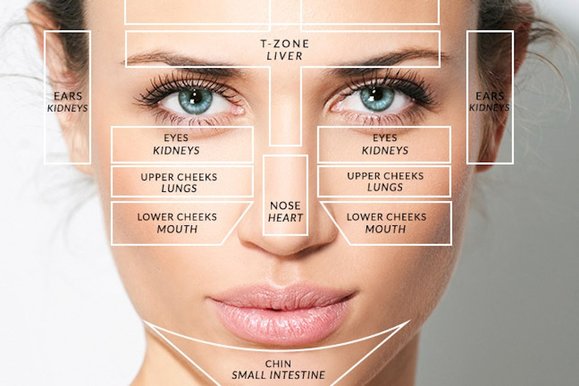
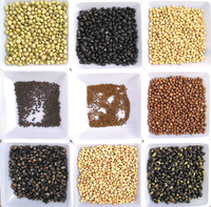
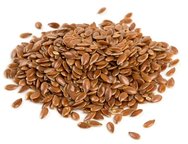
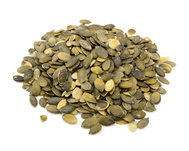
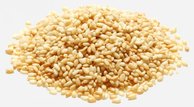
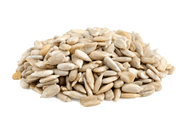


 RSS Feed
RSS Feed